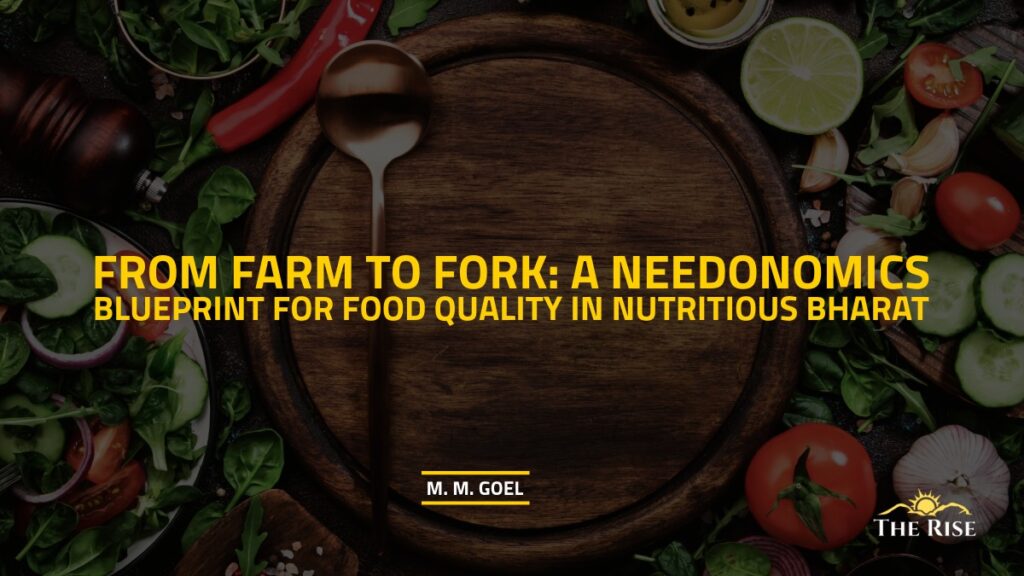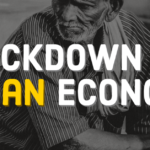Needo-consumption promotes balanced, mindful eating to support health and national food security. NST stresses farmer education alongside subsidies to ensure quality production. FSSAI should act as a partner in maintaining standards. With stronger enforcement, better infrastructure, and conscious consumption, India can evolve into a food-exporting powerhouse.
The quality of food we consume is not merely a matter of taste or preference; it is a determinant of national health, productivity, and dignity. The Needonomics School of Thought (NST) firmly believes that food quality is both a moral and an economic issue, requiring urgent attention in Bharat. The recent survey by the Food Safety and Standards Authority of India (FSSAI), revealing that 20 per cent of prepared food fails to meet prescribed standards, is alarming. It is not just a statistical finding; it is a wake-up call for introspection, accountability, and reform.
Food Quality as a Moral and Economic Imperative
In a nation where millions still face starvation and hunger, food insecurity takes on a double edge—it harms human dignity and impairs economic progress. When substandard food enters the market, it not only cheats consumers but also silently undermines their health, leading to a loss in productivity and increased healthcare costs. In such a context, food wastage is morally deplorable and economically irrational.
Needonomics School of Thought advocates that quality food is not a luxury—it is a necessity. It is not enough to talk about “feeding the hungry” without addressing the nutritional value and safety of the food being consumed. Food quality standards should be treated as a fundamental right of citizens, with enforcement mechanisms that are both robust and transparent.
Dual Strategy for Food Security and Global Competitiveness
India must adopt a dual strategy, first by reducing substandard food production domestically through rigorous enforcement of quality standards, and second by tapping the potential of its agricultural surplus for exports while ensuring that every product meets international benchmarks.
The latter is especially crucial in the current climate of global trade challenges. Tariff barriers are often justified under nationalistic trade policies like the so-called “Trump-era protectionism.” These can be countered effectively only if India’s agricultural exports are recognised for their uncompromising quality. In global markets, there is zero tolerance for safety lapses, and even a single incident can severely damage a nation’s brand for years.
The NST Mandate: Practical Solutions
NST calls for practical, systemic solutions that address the root causes of poor food quality. These include:
- Strengthening the enforcement capacity of FSSAI so that regulations are not just written but effectively implemented at every level—from small vendors to large manufacturing units.
- Enhancing production and storage practices through technology adoption, better training, and infrastructure upgrades. Post-harvest losses in India remain alarmingly high; poor storage alone is responsible for massive wastage of grains, fruits, and vegetables.
- Building capacity across the food supply chain, ensuring that farmers, transporters, processors, and retailers are all trained and incentivized to uphold quality standards.
NST emphasizes that these measures are not optional, but essential if Bharat is to transform from a food-deficient nation to a food-exporting powerhouse.
Needo-Consumption: A Mindful Approach to Eating
As income levels rise, dietary habits often shift in unhealthy directions, marked by overconsumption, excessive reliance on processed foods, and the neglect of traditional, nutrient-rich diets. To address this, NST proposes the concept of “Needo-consumption,” which encourages eating according to need rather than greed. This approach prioritises fresh, locally sourced, seasonal produce over ultra-processed, nutritionally hollow products, and promotes reducing food wastage through mindful portioning, sharing surplus, and better meal planning.
Needo-consumption is not about austerity—it is about balance and awareness. By consciously choosing what, when, and how much to eat, we contribute to both personal health and the larger goal of national food security.
Linking Food Quality to Economic Productivity
Poor nutrition has a direct and measurable impact on economic performance. Malnourished workers are less productive, more prone to illness, and often unable to break out of the poverty cycle. The cost of treating diet-related diseases—such as diabetes, hypertension, and obesity—places a huge burden on the healthcare system.
Also Read: INDEPENDENCE DAY SPECIAL
NST emphasizes that investing in food quality is investing in economic growth. A healthy population has higher cognitive capacity, better work efficiency, and reduced absenteeism. The benefits extend to education as well; children receiving safe, nutritious food have better learning outcomes and long-term prospects.
The Role of Farmers and Producers
Food quality begins at the farm. While enforcement agencies like FSSAI act as gatekeepers, the true foundation of safe food lies with farmers and primary producers. They must be equipped with quality seeds, safe fertilizers, and modern farming practices that minimize chemical residues. Cold storage facilities and efficient transportation networks must be expanded to prevent spoilage and contamination. Strengthening Farmer-Producer Organizations (FPOs) is equally important, as they give small farmers collective bargaining power and access to better markets.
NST believes that farmer education is as important as farm subsidies. Without knowledge of quality parameters, even the most well-intentioned farmers can unknowingly produce substandard goods.
Technology as an Enabler
Technology can play a transformative role in ensuring food safety:
- Blockchain for traceability, enabling consumers to know the origin, journey, and handling of their food.
- AI-based quality inspection in processing plants identifies contamination or defects instantly.
- IoT-enabled cold chains to monitor storage conditions in real time, preventing spoilage.
These innovations are no longer futuristic—they are available and affordable. What is needed is a policy push and industry adoption.
Strengthening the FSSAI: Beyond Policing
While enforcement is essential, the FSSAI must also evolve into a capacity-building institution. It should conduct regular training programs for street vendors, small restaurants, and food processors on hygiene and quality standards, and run public awareness campaigns to educate consumers on reading labels, understanding expiry dates, and recognising signs of spoilage. Building partnerships with state governments will be key to ensuring effective local-level vigilance. In NST’s vision, the FSSAI should be seen not as a fear-inducing regulator, but as a trusted partner in quality assurance.
From Farm to Fork: A National Commitment
Improving food quality is a collective responsibility:
- The government must set and enforce the rules.
- Producers and traders must commit to compliance, seeing it as a business advantage rather than a burden.
- Consumers must demand quality and be willing to pay a fair price for it.
When each link in the chain takes ownership, the outcome is not just safer food but a stronger economy and a healthier society.
Conclusion
Bharat’s aspiration to be a global food exporter cannot be fulfilled without first ensuring that every plate at home meets the highest quality standards. The 20 per cent failure rate in FSSAI’s survey is not just a figure, but a red flag demanding immediate action towards a nutritious Bharat. By embracing the NST mandate—strengthening enforcement, enhancing production and storage, building supply chain capacity, and adopting Needo-consumption—India can transform its food economy from one plagued by deficiencies to one celebrated for excellence. Food is not merely a commodity; it is a covenant between the producer and the consumer, the state and its citizens. Upholding its quality is not just an economic strategy—it is an ethical duty. In doing so, Bharat will not only feed itself well but also nourish the world with trust, taste, and truth.
Disclaimer: The views expressed in this article are of the author solely. TheRise.co.in neither endorses nor is responsible for them. Reproducing this content without permission is prohibited.
About the author
Prof. Madan Mohan Goel, Former Vice Chancellor and Propounder of Needonomics School of Thought.






































Pingback: Needonomics: From-debt-to-dignity - TheRise.co.in